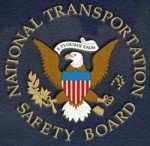Tue, Nov 17, 2009
Wants Stricter Guidelines For Government Helo Operators,
Legislation From FAA
 The NTSB Monday issued a set of
recommendations for the FAA and Public Helicopter Emergency Medical
Services Operators, following a 2008 fatal accident in Prince
Georges County, Maryland in which three people were killed and
another sustained serious injuries. The helicopter was being
operated by the Maryland State Police in a medevac operation.
The NTSB Monday issued a set of
recommendations for the FAA and Public Helicopter Emergency Medical
Services Operators, following a 2008 fatal accident in Prince
Georges County, Maryland in which three people were killed and
another sustained serious injuries. The helicopter was being
operated by the Maryland State Police in a medevac operation.
The NTSB determined that the probable cause of this accident was
the pilot's attempt to regain visual conditions by performing a
rapid descent and his failure to arrest the descent at the MDA
during a nonprecision approach. Contributing to the accident were
(1) the pilot’s limited recent instrument flight experience,
(2) the lack of adherence to effective risk management procedures
by the MSP, (3) the pilot’s inadequate assessment of the
weather, which led to his decision to accept the flight, (4) the
failure of the Potomac Consolidated Terminal Radar Approach Control
(PCT) controller to provide the current ADW weather observation to
the pilot, and (5) the increased workload on the pilot due to
inadequate FAA air traffic control handling by the DCA Tower and
PCT controllers.
In light of the accident, the NTSB has recommended that
operators of medical helicopters, and in particular governments
engaging in medevac operations:
- Develop and implement flight risk evaluation programs that
include training for all employees involved in the operation,
procedures that support the systematic evaluation of flight risks,
and consultation with others trained in helicopter emergency
medical services flight operations if the risks reach a predefined
level.
- Use formalized dispatch and flight-following procedures that
include up-to-date weather information and assistance in flight
risk assessment decisions.
- Install terrain awareness and warning systems on your aircraft
and provide adequate training to ensure that flight crews are
capable of using the systems to safely conduct helicopter emergency
medical services operations.
 In a companion letter to the FAA,
NTSB Chair Deborah Hersman recommends that Administrator Babbitt
seek specific legislative authority to regulate helicopter
emergency medical services (HEMS) operations conducted using
government-owned aircraft to achieve safety oversight commensurate
with that provided to civil HEMS operations.
In a companion letter to the FAA,
NTSB Chair Deborah Hersman recommends that Administrator Babbitt
seek specific legislative authority to regulate helicopter
emergency medical services (HEMS) operations conducted using
government-owned aircraft to achieve safety oversight commensurate
with that provided to civil HEMS operations.
In addition, the NTSB reiterated the following previously issued
recommendations to the Federal Aviation Administration:
- Require all emergency medical services (EMS) operators to
develop and implement flight risk evaluation programs that include
training all employees involved in the operation, procedures that
support the systematic evaluation of flight risks, and consultation
with others trained in EMS flight operations if the risks reach a
predefined level.
- Require all emergency medical services (EMS) operators to
install terrain awareness and warning systems on their aircraft and
to provide adequate training to ensure that flight crews are
capable of using the systems to safety conduct EMS operations.
- Require all rotorcraft operating under 14 Code of Federal
Regulations Parts 91 and 135 with a transport-category
certification to be equipped with a cockpit voice recorder (CVR)
and a flight data recorder (FDR). For those transport-category
rotorcraft manufactured before October 11, 1991, require a CVR and
an FDR or an onboard cockpit image recorder with the capability of
recording cockpit audio, crew communications, and aircraft
parametric data.
More News
Also: Outlaw Prop 4 Mooney, Ready 4 Duty, Ukrainian F-16 Pilot Lost, Blue Origin Flt On his journey to become the first pilot to land solo on all seven continents, 19-year-old Etha>[...]
Also: DarkAero Update, Electric Aircraft Symposium, Updated Instructor Guide, OSH Homebuilts Celebrate The long-awaited Sonex High Wing prototype has flown... the Sonex gang tells >[...]
Discrete Code As used in the Air Traffic Control Radar Beacon System (ATCRBS), any one of the 4096 selectable Mode 3/A aircraft transponder codes except those ending in zero zero; >[...]
From 2023 (YouTube Edition): Deviation from the Historical Mean Racine, Wisconsin-based DeltaHawk is a privately-held manufacturer of reciprocating engines for aircraft and hybrid >[...]
Aero Linx: Formation and Safety Team (F.A.S.T.), USA The Formation and Safety Team (FAST) is a worldwide, educational organization dedicated to teaching safe formation flying in Wa>[...]
 Airborne 07.02.25: TikToker Arrested, Vietnam A/L Ground Hit, ATC Modernization
Airborne 07.02.25: TikToker Arrested, Vietnam A/L Ground Hit, ATC Modernization Airborne Affordable Flyers 07.03.25: Sonex HW, BlackShape Gabriel, PRA Fly-In 25
Airborne Affordable Flyers 07.03.25: Sonex HW, BlackShape Gabriel, PRA Fly-In 25 ANN's Daily Aero-Term (07.07.25): Discrete Code
ANN's Daily Aero-Term (07.07.25): Discrete Code Classic Aero-TV: DeltaHawk Aero Engine Defies Convention
Classic Aero-TV: DeltaHawk Aero Engine Defies Convention ANN's Daily Aero-Linx (07.07.25)
ANN's Daily Aero-Linx (07.07.25)




